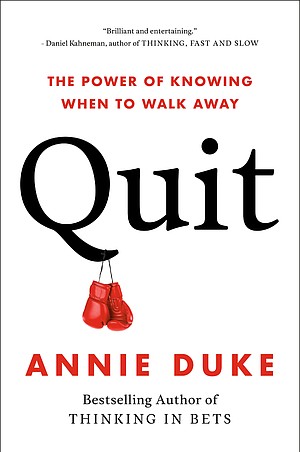10/17/2022

It's over.
The last page is read, the credits are rolling, your plate is clean, you've said your good-byes for tonight, for this weekend, for this month, forever. It's time to turn your back and walk away – or is it? In "Quit" by Annie Duke, learn when to say alright and when to say adieu.
Quitters never win, quit the process and you're quitting the result, nobody said it would be easy, blah blah blah. Platitudes aside, you're done messing with that thing and you'd like to throw in the towel but you've invested so much time and quitting is for sissies, blah blah.
We've all heard those sayings before but, says Duke, believe it or not, a premature ending can be the best thing that could happen sometimes... but not always. It truly depends.
Knowing when to quit, she says, is an important life skill but it's not as glamorous as stick-to-it-iveness. People tend to remember those who persevere, no matter the outcome, but they don't generally remember those who get off the merry-go-round before the music stops. Still, she says, if she was going to teach someone to make better decisions, "quitting is the primary skill" she'd pick.
"Trying something and having the ability to quit is vital to how we all live our lives."
So how do you know when it's time to stop the foolishness?
Learn to re-frame your decisions to determine whether it's better to stay or go; if it's a close call, the latter's probably the better option. Remember that public opinion isn't always right. Quit when you're ahead if the future looks bleak, and be aware of a nasty phenomena called "loss aversion." Also watch for "sunk cost," which can cause you to continue because you think things just have to get better eventually. They won't.
Set a list of "kill criteria" before embarking on a project. Don't be too optimistic. And remember that there'll always be times when the choice to quit is yours, and times when "the world makes the choice for you."
In the last almost-three years, you've probably asked yourself a dozen times why. You don't need a subject, sometimes "why" is the entire question and "Quit" is the answer.
It's not an easy one, though. Author Annie Duke breaks the dilemma down in four sections that help readers learn how to make the right decision, and that empower them to take a possibly-unpopular action. These are hefty sections, too, with meaty words for you and for your too-loud, often-wrong inner naysayer.
The lessons imparted are ones we all need to understand fully, but they're not the only things you'll find in this book. Duke bolsters her advice with pertinent anecdotes that are entertaining, even if you're not in need of a coin to flip any time soon.
Read this book for that amusement or, if you need to know how to do the right thing at what looks like the wrong time, read it for instruction. Either way, "Quit" is good, full stop.
